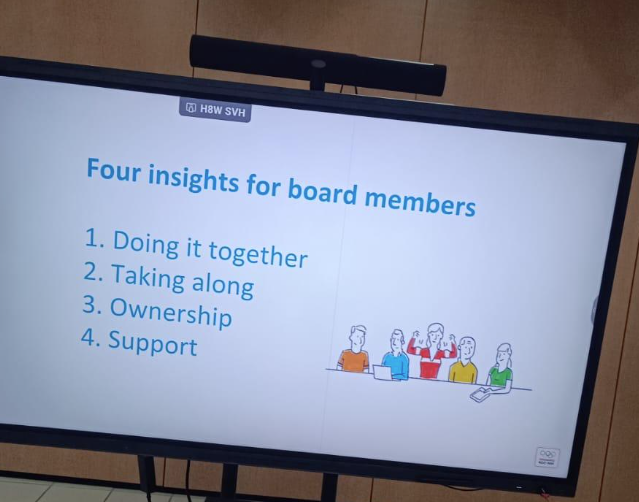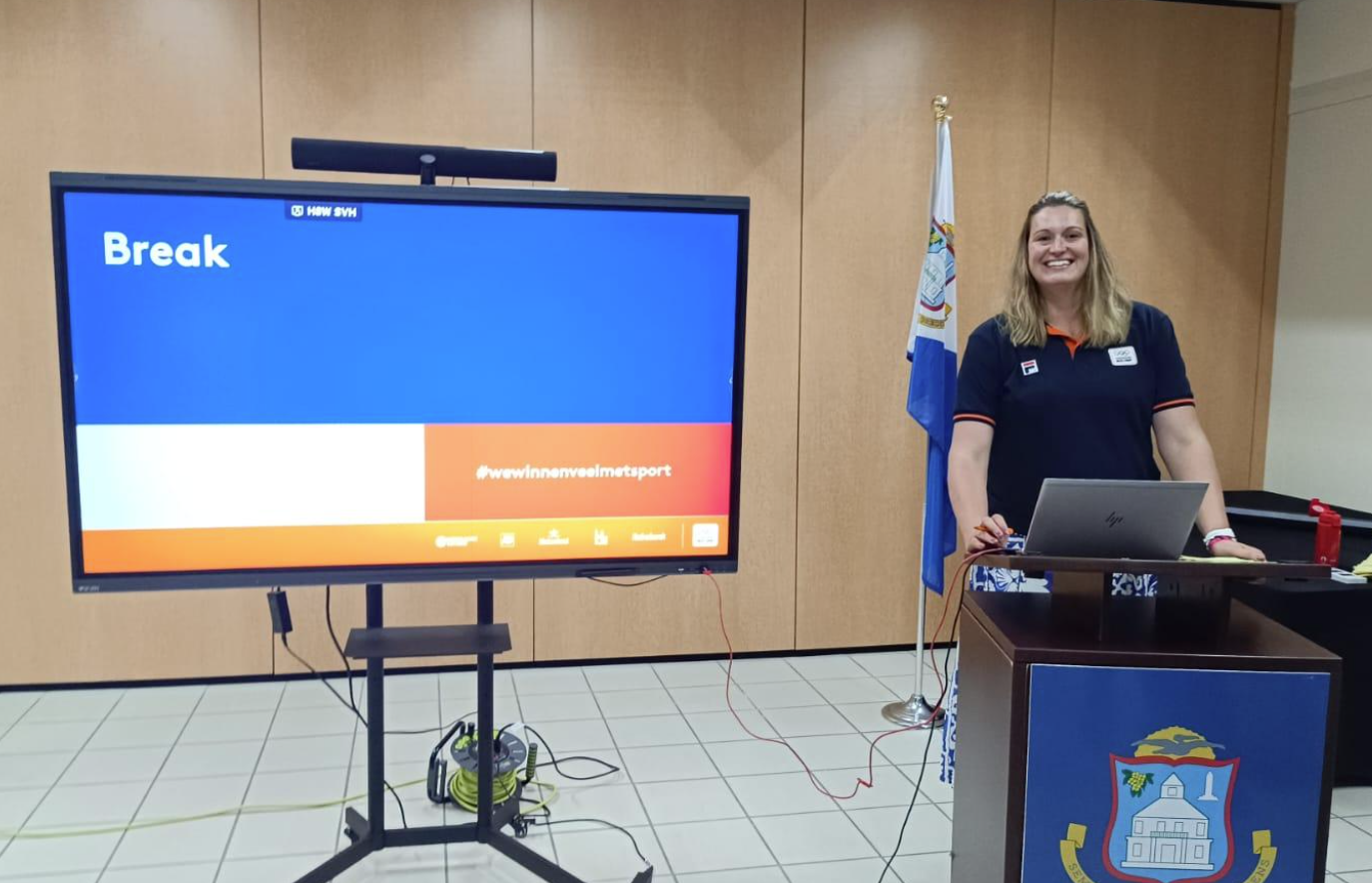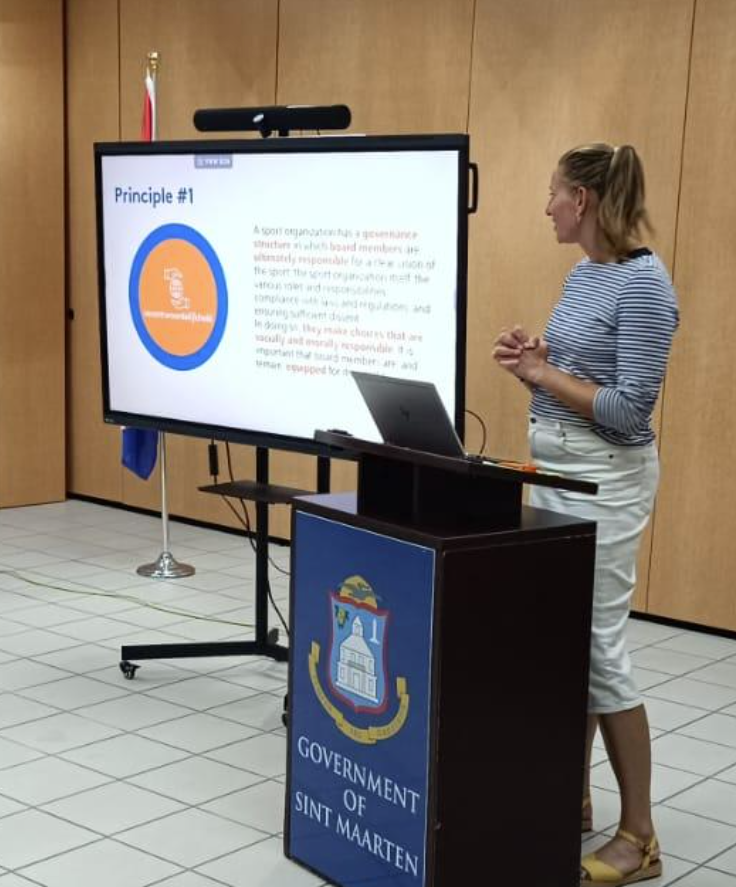Stronger Boards, Stronger Sport: SMSF workshops set new standards for sports governance

GREAT BAY--The Sint Maarten Sports Federation (SMSF), working with NOC*NSF and the Dutch Ministry of Volksgezondheid, Welzijn en Sport, hosted two specialized workshops on August 14 and 18, 2025. The sessions targeted the most urgent needs identified by the sector in March 2025 during the SMSF General Assembly and Sports Conference: governance, finance, and volunteer management. The goal was clear: get boards, administrators, coaches, and clubs speaking the same language of good governance, transparency, and accountability, so that athletes, coaches, and officials benefit over the long term.

𝐀𝐭𝐭𝐞𝐧𝐝𝐚𝐧𝐜𝐞, 𝐫𝐞𝐚𝐜𝐡, 𝐚𝐧𝐝 𝐰𝐡𝐨 𝐰𝐚𝐬 𝐢𝐧 𝐭𝐡𝐞 𝐫𝐨𝐨𝐦
Out of 59 registrants, 45 attended Day 1 and 50 attended Day 2. Although SMSF currently has 25 member bodies on paper, the Federation took a strategic decision to open the workshops beyond its direct membership. The result was broad sector engagement and a 75 percent participation rate.
Disciplines represented included basketball, baseball and softball, football, aquatics, sailing, boxing, bodybuilding and fitness, Special Olympics, automotive, volleyball, canoeing as an observer since 2024 pending membership, and badminton which is in process of becoming a member. In addition, sports clubs, community sports organizations, and support foundations participated, ensuring cross-sector input.

There were 36 board members, roughly 65 percent of all participants. The room also included five coaches and trainers, three volunteers, four directors and coordinators, three administrative staff comprising secretary, office manager, and sports administrator, plus two others identified as a student researcher and a supporting partner. The mix shows that the workshops reached not only boards, but also people who run day-to-day sport.
SMSF noted that not all member federations and organizations could attend. Evening scheduling was necessary, yet it overlapped with training times for some sports. The Federation stressed that the sector’s current state makes collaboration and professionalization more urgent, which means sustained investment in education and in the stability of boards, administrators, coaches, trainers, and officials.
The three themes, governance, finance, and volunteer management, were selected directly from priorities set in March. SMSF’s view is straightforward: a professional and sustainable sports system starts with strong foundations at board and administrative level. When governance is solid and everyone understands roles, rules, and responsibilities, service to athletes improves and growth becomes durable.
𝐂𝐨𝐧𝐜𝐫𝐞𝐭𝐞 𝐚𝐜𝐭𝐢𝐨𝐧𝐬 𝐚𝐧𝐝 𝐨𝐧𝐠𝐨𝐢𝐧𝐠 𝐜𝐨𝐦𝐦𝐢𝐭𝐦𝐞𝐧𝐭𝐬
Naomi Korstanje, President of the St. Maarten Sports Federation explained that the SMSF board committed to continuing these workshops so that members and the wider community can repeatedly build skills, from attracting and retaining volunteers, to strengthening governance, and ending with disciplined financial planning. Participants committed to taking the content back into their organizations and applying it in daily practice. This matters in Sint Maarten, where frequent board turnover and dormancy in some federations have hurt continuity and slowed development. The August sessions marked the second round of training on these topics, a deliberate move to reinforce learning.
Next steps include one-on-one support for internal restructuring; needs-based training targeted to organizational bottlenecks; finalizing a sector-wide needs assessment; and building a training database to support customized courses. SMSF’s message is that sport is larger than trophies and medals. It is about sustainable impact on society, unity, national pride, health and wellness, collaboration, and opportunities for young people. The commitment is not to chase medals alone, but to embed long-term growth and professionalism across the sector.
𝐖𝐡𝐚𝐭 𝐭𝐡𝐞 𝐞𝐯𝐚𝐥𝐮𝐚𝐭𝐢𝐨𝐧𝐬 𝐬𝐚𝐲
SMSF has collected evaluations from 30 percent of participants so far and will continue to gather feedback. Early results indicate a strong start:
• Overall rating, 86 percent good to very good.
• Usefulness of content, 79 percent positive.
• Practicality of tools, 71 percent positive, which signals room for more hands-on, ready-to-use resources.
• Presenter’s knowledge, 93 percent positive, the highest score.
• Style and interaction, about 79 percent positive.
• Personal learning goals, 43 percent strongly positive, indicating a demand for more tailored and specific applications.
Participants highlighted several takeaways: recruit, motivate, and retain volunteers since they are the backbone of sports organizations; strengthen financial planning, accountability, and governance, while exploring new funding avenues; improve board structures, roles, and responsibilities with targeted training and added human capacity; and build a stronger culture of collaboration and knowledge sharing, locally and with international peers.
𝐅𝐢𝐧𝐚𝐧𝐜𝐞, 𝐚𝐜𝐜𝐨𝐮𝐧𝐭𝐚𝐛𝐢𝐥𝐢𝐭𝐲, 𝐚𝐧𝐝 𝐩𝐫𝐚𝐜𝐭𝐢𝐜𝐚𝐥 𝐬𝐮𝐩𝐩𝐨𝐫𝐭
After the finance workshop, SMSF asked federations to take financial reporting seriously. Transparent, well-structured practices build trust, secure partnerships, and improve sustainability. Practical tools from the workshop, including budgeting templates and planning methods, are intended to help organizations lay stronger foundations for responsible growth and strategy.

SMSF stands ready to assist with follow-up sessions, one-on-one guidance, and needs-based training. The Federation is sharing lessons from its own restructuring, expects accountability from members, and will extend support to the broader community as internal capacity allows. In several cases, SMSF has already hosted stakeholder meetings for member bodies to help manage conflicts or address restructuring questions.
The Federation is breaking with past practices and partnerships that harmed the institution, and is embracing a growth mindset. It seeks knowledge from partners such as CANOC, Centro Caribe Sports, and NOC*NSF, and is calling on local experts to volunteer their time. Finances and capacity remain major challenges on Sint Maarten, so collective learning is essential.
SMSF is asking all organizations to participate in ongoing data collection and research. Without clear budgets, financial overviews, or multi-year plans, it is harder to advocate for subsidies or to build partnerships on their behalf. Immediate goals include finalizing the financial needs assessment and preparing an overall budget breakdown for sport.
𝐁𝐮𝐢𝐥𝐝𝐢𝐧𝐠 𝐭𝐡𝐞 𝐧𝐚𝐭𝐢𝐨𝐧𝐚𝐥 𝐩𝐢𝐜𝐭𝐮𝐫𝐞: 𝐩𝐥𝐚𝐧𝐬, 𝐜𝐚𝐥𝐞𝐧𝐝𝐚𝐫𝐬, 𝐚𝐧𝐝 𝐜𝐚𝐩𝐚𝐜𝐢𝐭𝐲
In parallel, the Federation is working toward a detailed national sports budget based on needs assessment results; aligning the 2025 to 2026 National Sports Calendar, and subsequent years such as 2026 to 2027, with national, regional, and international participation opportunities; and investing in the education and upgrading of sports administrators and boards, as well as coaches, trainers, and officials. SMSF describes this as a baseline study for the sector where accountability and transparency are the core pillars of good governance.
𝐄𝐱𝐩𝐞𝐫𝐭 𝐚𝐝𝐯𝐢𝐜𝐞 𝐭𝐨 𝐛𝐨𝐚𝐫𝐝𝐬 𝐚𝐧𝐝 𝐚𝐝𝐦𝐢𝐧𝐢𝐬𝐭𝐫𝐚𝐭𝐨𝐫𝐬
Experts urged organizations to re-examine board composition and competencies, align roles to strengths, and anchor decision-making to a clear, shared vision. They encouraged ongoing reflection and professional development, so board members understand their duties and practice modern sports governance. Boards were asked to develop and submit multi-year strategic plans to SMSF that justify financial choices, strengthen accountability, and outline concrete partnerships across the sector, including board development, governance improvements, coach education, and athlete pathways. Empathy and transparency were stressed: engage new people, communicate openly, and ensure volunteers and members feel respected, since an association is only as strong as its membership.
𝐌𝐢𝐥𝐞𝐬𝐭𝐨𝐧𝐞𝐬, 𝐩𝐚𝐫𝐭𝐧𝐞𝐫𝐬, 𝐚𝐧𝐝 𝐦𝐞𝐚𝐬𝐮𝐫𝐢𝐧𝐠 𝐢𝐦𝐩𝐚𝐜𝐭
Korstanje, explained the next milestone is to finalize and review all evaluations in order to understand impact and to identify organizations ready to build stronger administrative and financial governance. SMSF will work closely with federations and associations that participated, while inviting others to see the workshops as opportunities. The Federation wants to expand buy-in and nurture a growth mindset. Collaboration and unity are central, so members feel ownership in the development process and in building a National Sports Vision.
She said. SMSF will engage the Tripartite partners, SMSF, the National Sports Institute, and the Department of Sports, and will collaborate with the Ministry of ECYS and other ministries such as VSA, Justice, and TEATT. The Federation is strengthening ties with NOC*NSF and the Dutch Ministry of VWS, and reinforcing ties with sister islands Statia and Saba. Regional affiliations with CANOC and Centro Caribe Sports remain part of the plan to ensure alignment and cooperation.
She further added that impact will be measured by adoption of good governance: volunteer engagement and retention, transparent financial planning, stronger board structures, and strategic partnerships. SMSF indicates that it will support and collaborate with organizations that are serious about progress. "The aim is to establish a model of excellence in sports governance and development that others can follow. Together, we are stronger."

.jpg)